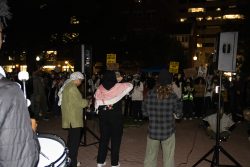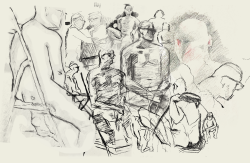The National Seminary of Catholic University is a quiet gray building separated from the iconic dome of the National Basilica by the busy traffic of Michigan Avenue, which casts a flickering neon glow on a statue of the Virgin Mary on the front lawn. Inside, though, all is serene. A renovation in the 90s left the interior gleaming with tasteful iconography and soft light. Bulletin boards are sparse and symmetrical, with white flyers advertising sign-up for Solemn Holy Hour—a far cry from the frenetic visual overload of Red Square.
It is to this building that Dan Hill came after two years at Georgetown. Rather than graduate with the class of 2008, he chose to pursue a lengthy course of study, at the completion of which he will be ordained as a Diocesan priest. It’s an unusual—perhaps even a shocking—choice in today’s culture, as seminary display cases containing the photos of each graduating class attest. The 1953 class portrait showed 37 newly collared men; 2003 had just seven.
But the shrinking size of Catholic’s Theological College is hardly an anomaly. Nationwide, the number of priestly ordinations dropped from 994 in 1965 to 431 in 2006, even as the number of American Catholics jumped from 45.6 million to 64 million in the same time period. The current generation of American youth is markedly and actively religious, but poverty, chastity, and obedience simply aren’t lighting its collective fire. Even at Georgetown, where about half of the student body is Catholic, a life wholly committed to the Church isn’t an option most consider—the Career Center certainly doesn’t hold information sessions on the priesthood.
Still, there exists a subculture, exceptional even among the most dedicated Catholic students, of a small number of students undegoing the process of discernment—that is, figuring out whether God has called you to the clergy.
Hill seems older than his 21 years, a landmark he celebrated in traditional Hoya fashion last weekend at the Tombs. He discussed his vocation in a self-assured, rounded voice, tailor-made for the altar. He began the process of discernment in high school, and can even pinpoint one particular Ash Wednesday service where he had what he calls an “Ignation moment” of realization. High school classmates jokingly called him “Father Dan,” but though he knew the seminary was in his future, he still wanted to have the traditional college experience. After two years, though, he decided to make a switch. Though friends were “boggled by the idea of leaving the number 23 school,” Hill says that joining the priesthood isn’t about giving things up, it’s about a radical emptying of the self in order to become a part of something greater.
Asked what his specialization will become after ordination, Hill laughed with the knowing abandonment of someone who’s begun to understand his role in a vast system—“I’m gonna do whatever my bishop tells me to do!”—and though he admitted that the obedience aspect of his vows was the most difficult for him, his tone was anything but that of bitter resignation. He repeatedly emphasized the joy he felt at being able to take on the role of “alter-Christus,” or an earthly stand-in for Christ.
Life at the seminary stands in marked contrast to life here. A sense of scheduled order is pervasive, but Hill said that the perception of seminarians as stiff is false.
“The high age of clericalism is gone,” Hill said. “We’re a man before a priest, and we have to be able to relate to people on a real level.”
Nationwide, there were 50 men who joined the Jesuits as novitiates in 2006. In a typical year, about a third of these novices come straight from college. Father Stephen Spahn SJ (SFS ’92) of Holy Trinity, who serves as a Vocations Promoter for the Maryland Province of the Jesuits, says that more novitiates in his region come out of Georgetown than any of the other 27 Jesuit universities. He thinks that there is good reason for this, citing the plurality of religious traditions present on campus (as opposed to what he calls “a Catholic ghetto”) for promoting the sort of lively religious discourse that promotes the stringent examination of one’s own personal faith—Spahn’s ‘pagan’ roommate ended up writing his recommendation for the Jesuits.
According to Spahn, the numbers of the Society have been consistent in the past 20 years, and counter-intuitively, there was even a slight spike in the wake of the sexual abuse scandals.
“When I entered and first put on this collar, most people thought I was a noble curiosity,” he said. Studying in Boston at the height of the scandals, “Overnight I became a suspect menace. I would sometimes succumb to the temptation to pull off the collar for the drive home. That situation has been a real cross to bear for many of us. ”
In talking to Hoyas who are considering the priesthood, it becomes clear that though each has a surprisingly individuated take on what it’s like to have those thoughts in a culture like Georgetown’s, there are several common threads they share: an assurance that God is calling them to this life, an impressive fluency in the language of church doctrine and papal encyclicals, a humble acknowledgement of their own shortcomings and a uninhibited willingness to discuss some of the most personal details of their spiritual lives. But more striking perhaps is their shared normalcy—none seem cloistered off from Georgetown social life or especially puritanical, and they are certainly not proselytizing. Until each began talking about their call from God, each could have been any ordinary, polite Joe Hoya pondering future plans.


More concretely, membership in the Knights of Columbus or regular attendance at Father King’s daily 11:15 mass is almost unanimous among this group. King himself, known for his traditional mass and popular sermons, is a particularly visible part of discernment on campus. Most of the young men interviewed for this article cited him as a spiritual influence, especially because of his longtime involvement with a monthly meeting of sometimes as many as a dozen men who are undergoing the discernment process.
King did not respond to requests for comment for this story.
Spahn, too, spoke of the influence King had on his own spirtitual life and that of generations of Hoyas.
“That fact sort of spooks some of the Jesuits—they start to ask, is it just a cult of personality? But I think that Tom, in the solemnity of the mass and the dedication that he shows to that life, just affords young Hoyas a place to pray. We’ll all find our vocations in the quiet time with our thoughts and with God.”
James Johnsen, (SFS ‘10), has wanted to be in the Society since his sophomore year at a Jesuit high school, and though he very seriously considered the lay ministry at one point, says that now it is really only the timing of when he’ll enter the order that is uncertain.
“A lot of people daydream about who they will marry, their house, their life—don’t kid yourself, boys do it too—but I rarely find my thoughts wandering to what ‘Mrs. James Johnsen’ will look like. That phrase just sounds weird,” he said. “ I find myself imagining what it’s like to minister, to consecrate the Eucharist. To me that daydream is more readily available, and that’s been very telling in my discernment.”
Johnsen likes the emphasis on learning within the order, but is also attracted to the idea that Jesuits can “go out and have a career in anything” but always have a community to come back to. Much of his spirituality is tied to what he characterizes as contemplation in action. His longish hair, black-rimmed glasses, and intent gaze lend him the air of precocious theologian one minute and that of mildly amused hipster the next when he laughingly calls Christian rock “just really terrible music.” As a freshman, he’s still working through the process of integrating life as a college student with his devotional life.
“Going out on a Thursday night is not very conducive to a spiritual night, “ he said. College anywhere entails a quick, social pace of life. To consider God at work in the world in spite of the noise, these are challenges, and I don’t always succeed.”
Matt Bjonerud (MSB ’07), also intends to join the Jesuits, but again, it’s a question of precisely when for him. Next year, he will put his finance degree to use as a corporate banker, a decision he explains by invoking the example of St. Paul, who used his riches to support the poor all the while growing in prayer.
When he first heard the call, “I tried to tell God ‘no’, but I gave up, and have been growing into it ever since.”
The issue of giving up a family, something he’d always wanted, was particularly hard for Bjonerud, and there are still some days where it remains difficult. Still, he said, “I’ve never gone to prayer and not received help. There’s an excitement about what’s coming, a hope for the future so that I’m not thinking about what I’m giving up.”
In addition to starting an Ignatian-style meditation group within the Catholic Students association, Bjonerud organized a soup-for-the-homeless program in which participants actually slept on the streets in tents in order to replicate the way Jesus ministered among his people. He was on the crew team his freshman year, and was particularly well-liked in his sophomore year tenure as an RA because of his laid-back, friendly attitude. He, too, seems very much in the fold of the social life of a senior. He is a member of Intervarsity and says that his Protestant friends seem culturally less timid about expressing their faith, and have been some of the most vocal supporters of his decision. This sort of exposure to a wide variety of traditions is what he says makes Georgetown a ‘fantastic’ training ground.


In the endless debate about how Catholic Georgetown is, and should be, there are people who believe that it is not nearly Catholic enough. Joe Zwosta (COL ’07) disagrees that Georgetown is thoroughly welcoming place. He is “very seriously” considering applying to the diocese of Brooklyn after graduation, and in fact has no alternate plans. But he disagrees with Bjonerud’s assessment of the school:
“As a whole, this is not a very supportive culture for practicing religion in general, let alone considering the religious life,” he said. “Sure, 50 percent of the school is Catholic, but how many make it an integral part of their life, even if they go to mass on Sunday,” he said.
Despite that criticism, Zwosta doesn’t really isolate himself from the Georgetown community. He might be a bit more obviously conservative than many of his friends, but no one meeting Zwosta in the Tombs on a Friday night would suspect that sees his path as being vastly different from the common culture of the school.
Zwosta said he feels called to Diocesan work rather than, say, the Jesuits or the Dominicans, because of the role it affords him in the world. In a parish, he eagerly anticipates being intimately involved in all the important, sacramental moments in life—baptism, confession, mass, burial. He said that despite the public obsession with it, celibacy has never been the main stumbling block for him, and candidly revealed that there has never been a love interest that caused him to deeply question his decision.
Though young men who want to become priests are few and far between, women on the Hilltop contemplating joining the sisterhood are an even rarer breed. Sister Anne Elizabeth Fiore (COL ‘99), animated and small in her traditional habit, entered the Convent of Georgetown Visitation a year after her graduation. She said that as a freshman she found that the spiritual life of campus was not particularly nourishing, and began going to the Convent for morning and evening prayers. Gradually, after realizing that she was structuring her entire day around that commitment, she began to consider that perhaps religious life was her calling. That was emphatically not a decision she wanted to make public; although there was a men’s discernment group and a support network of sorts for them, there was no real equivalent for women.
“I was too shy to talk about it at the time—it was such a precious thing that you didn’t share it in an environment that wasn’t protected, not welcoming to that.”
Fiore doesn’t see any evidence that there’s been a cultural shift on that front in the years since her graduation. In the past year she has been approached by just two women here. She believes that perhaps in this respect, Georgetown’s Catholic affiliation may be working against it. Although there were and are a number of thriving Catholic groups on campus, she believes you don’t need to work as hard to create a certain mindset when there is a presumed Catholic identity, and that on secular campuses, groups like the Newman Club (a nationwide Catholic organization) tend to work overtime to foster an environment in which discussion of vocations is welcomed.
Fiore is thoroughly satisfied with the role she plays as a nun, in which you “lay your gifts before the community, because the Lord has invited you to this place.” She is incredulous at discussion of the notion of ordaining women priests, likening the church to a marriage in which men and women have innately different roles they must play in order for it to function.
“If I had gotten married, I would have wanted to be a mother, not a father.” she said. “People forget that the church is not an equal opportunity employer; the church is not a democracy. I think we are influenced by our own sense of justice. You don’t hear men complaining that they wish they could be mothers.”
There are certain generational differences between the students who are now considering the holy life and the current, older generations of clergy. Older Jesuits in particular, who were spiritually formed in the era surrounding Vatican II, can be characterized as liberal. All the young men interviewed described themselves as orthodox—that is, maintaining what is currently accepted practice. Spahn said this generational difference is a question that the Jesuits have been considering.
“What we have to ask is whether we are willing to receive brothers who won’t look, act, talk like us. What does is mean to say that these men are conservative? They love their Pope, they love certain devotions that fell out a favor for a time, they love incense. They wear religious garb proudly. In it, people have a right to judge, to approach you on the street. They want to bear witness to something profound in the world and to the idea that their Church loves that world,” Spahn said.
“I tell older Jesuits, you were never their age: you were 18 once, but not in a 21st century, post-Christian, post-modern world. The Jesuit formation requires the spiritual exercises of St. Ignatius, it requires work with the poor, it requires a number of things so that before it’s all over they will be different men and will want to share in the redemptive work of the order. I challenge my brother Jesuits to trust in the formation process.”
Still, Spahn said that about half of novitiates leave before taking vows (after two years), and then roughly half of those leave before they are ordained, approximately 10 years down the line, but doesn’t see this as discouraging.
“This attrition demonstrates that the process is working. Our formation is long and lengthy for good reason.”
The faculty of Georgetown is sprinkled with professors who began vocations but were never ordained, for various reasons—Dean Hubert Cloke, for instance, was in the Jesuits for 13 years, before leaving “with no hard feelings—I obviously still feel a sympathy with their mission.” His story is not altogether uncommon for men of his generation, and he noted that entering the priesthood in a time when it’s less of a norm requires a much more deliberate, countercultural thought process.
Although, like a couple of the other young men, Johnsen emphasized that the Latin root of vocation means calling, he seemed a bit uncomfortable with the connotations of that word in English, disliking the lighting-bolt-from-the heavens image he believes it can evoke to a general audience.
“I wish it were that easy, but it’s a much more nuanced process,” he said, on the topic of others’ perception of his path. “It’s not a secret I’m keeping but it’s something of a private matter. I have this fear that in a strange group people will think that I’m this figure of judgment who is disapproving of teenage life in general, and I’m not. These are my friends.”
Bjonerud, too, is a little reluctant to discuss his discernment with many people. Like the other men, he dislikes assumptions of a ‘holier-than-thou’ attitude. “I’m perplexed by that and very aware of my shortcomings and the discipline I require,” he said. “I’m choosing a different way, not one that’s necessarily better.”
He wanted to share his story, though.“When I was a freshman, I would have been so encouraged to have read this, that other people were having these thoughts. I thought I was the only one.”




